#african diaspora religions
Explore tagged Tumblr posts
Text

Working on The Sacradness of the Mother and her Child give me joy !
164 notes
·
View notes
Text

#black history#black people#blacktumblr#black#black tumblr#pan africanism#black conscious#africa#black power#black empowering#religion#malcolm x quotes#black pride#black community#african diaspora#black diaspora
84 notes
·
View notes
Text
Tag yourself!
{made with the Ancestors and Great Spirits of the African Diaspora in mind, here's what I associate with each day of the week and the children of the diaspora born therein:
Monday's child is fair of face
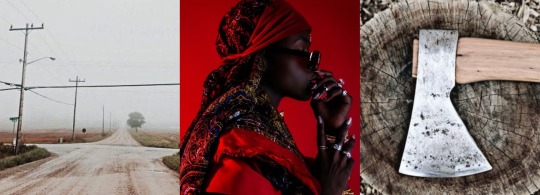
Tuesday's child is full of grace
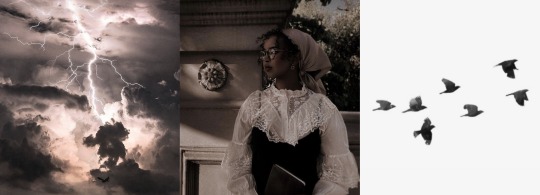
Wednesday's child is full of woe
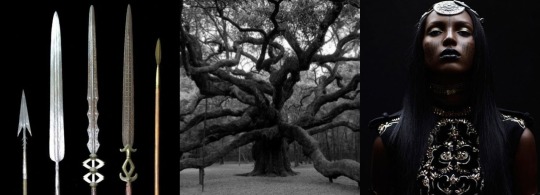
Thursday's child has far to go
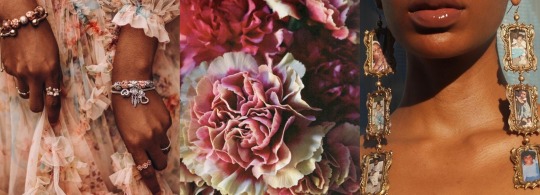
Friday's child is loving and giving
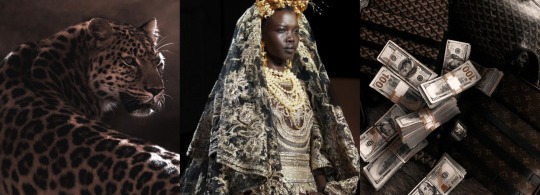
Saturday's child works hard for a living
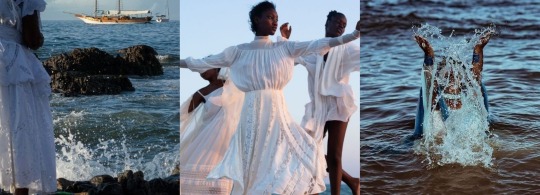
And the child born on the Sabbath day
Is bonny and blithe, good and gay.
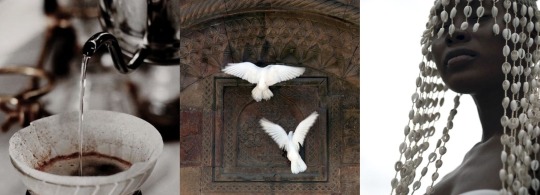
Monday: masters of finding new roads and moving forwards, tearing down blockages, trailblazers and warriors. Artists of all kinds, writers, poets, singers.
Tuesday: embodiment of thunderstorms, winds, omens, they're powerful conjurers with hot hands, always busy, always moving. Often times scholars, historians.
Wednesday: defenders, protectors, of humanity and nature as a whole. Warrior spirits at their core, but also great diviners and mediums.
Thursday: eloquent muses of the arts of love and war alike, great beauties who lead armies with equal charm and force. Sweetening, love and luck workings come easy to them.
Friday: personification of abundance and status. A commanding presence. Building legacy, great manifestors and conjurers, specially for work and finances.
Saturday: guardians of waters and the beyond. Community leaders, gifted healers, divine messengers. Carrying all the wisdom of the Elders and Ancestors.
Sunday: priests and priestesses that defy status quo, very old Ancestors coming back to reshape and rebirth reality. They will enter your life and purge every aspect of it.}
#Hoodoo#Rootwork#Conjure#Black Conjure#African american conjure#Hoodoo aesthetic#Hoodoo academia#I've had this in my drafts for so long!!!#enjoy :')#ATRs#ADRs#African Traditional Religions#African Diasporic Traditions#African Diasporic Religions#African Diaspora#afrolatine#afrolatinos
456 notes
·
View notes
Text
Recently watched The Skeleton Key again and was not too pleased with how Hoodoo was portrayed (especially with them saying it started in Louisiana, Hoodoo started throughout the south simultaneously). I’m noticing that the more and more I watch a movie, the more I kinda be like.. why did they portray it like that??
But I wanted to ask all of my ATR practitioners out there, hoodoo, voodoo, lucumi, isese, santeria, obeah, etc., have you ever watched a movie and felt as if your practice was portrayed in its authentic and complex form??
#this is for the diaspora#african traditional religions#atrs#Santeria#palo mayombe#hoodoo#voodoo#obeah#candomble#isese#lucumi#21 divisions#African diaspora#diasporic religions#representation#cultural representation#culture#African American#afro caribbean#afro latina#black spiritualism#black spiritualist#african american spirituality#hoodoo tumblr#black spirituality#black tarot readers#african american culture#rootwork tumblr#rootworker tumblr#black tumblr
25 notes
·
View notes
Text
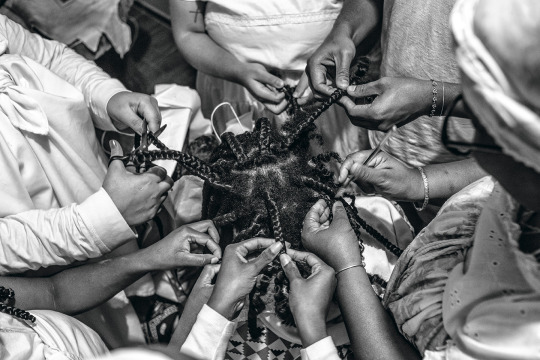
Women braid young woman's hair. The young woman is 17 years old, deaf and holds the position of iabassê, responsible for looking after the traditions of the terreiro.
#nagô#Candomble#Terreiro#Culture#Religion#iabassê#youth#African Descent#African Diaspora#ceremony#Brazil#South America
88 notes
·
View notes
Text
Papa Legba: The Gatekeeper of Haitian Vodou

https://ahavacelestialorder.org/papa-legba-the-gatekeeper-of-haitian-vodou/
The Dual Nature of Legba: Trickster and Teacher
While Papa Legba is primarily known for his wisdom and role as a guide, he also has aspects of the trickster archetype, particularly in his African origins. Similar to Eshu in Yoruba belief, Legba can be mischievous and unpredictable, reminding humans of the complexity of life and the delicate balance between chaos and order. He is sometimes depicted as testing individuals, forcing them to confront challenges or difficulties in order to gain wisdom or access to spiritual insights.
Legba’s role as a trickster is not malevolent but serves to teach important lessons about humility, respect, and the proper way to approach the spiritual realm. He may present obstacles to test one’s sincerity or to ensure that a person is prepared for the spiritual journey they are about to undertake. This dual nature of Legba as both a gatekeeper and trickster is vital to understanding his complexity and the deep respect practitioners hold for him.
7 notes
·
View notes
Text
Peace ‼️ … In The Name of Allah Lord of All The Worlds :
Today’s Supreme Mathematics is Wisdom Equality all be or born to Build or Destroy :
Wisdom … is the supreme manifestation of one’s knowledge. It is hav’n that supreme ability to discern life’s experiences wisely without falling victim to the devil’s trick-ology.
Equality … means to be equal. Thus equality also means to reciprocate justly. For to whom much is given much is expected or required.
In order to build (which means to add on) and sustain anything of value as a Nation , we all must show forth and prove, not with just words alone … b.u.t. through our equality a sense of loyalty and commitment to the same principles and core values.
A Nation cannot rise No higher than its people ‼️
Therefore, we must destroy (which means to eradicate) all negative differences, strifes, jealousy, envy, hate, and greed that exist amongst us that threatens the growth and development of our Nation.
This 👆🏾 is the only solution and resolution to our survival.
We (NGE) all must learn to put our babies and our Nation 1st , for it was and still is the will of Allah aka the Father. He had sacrificed his physical existence so that we (NGE) carry on and carry out his World Manifest (Allah’s World Manifest).
Peace ‼️ … Sincere B’Real Great-Mind God Allah. Savior Cee Region 4
#nation of gods and earths#supreme mathematics#five percent nation#allah school in mecca#hip hop#5% nation of gods and earths#black women#father allah#black men#black people#religion#spirituality#african american#african diaspora#knowledge of self#Science of Self
6 notes
·
View notes
Text
We prosper where we are planted💚
Ancestor money for the African diaspora
#pan africanism#african traditional religions#african diaspora#diaspora#hoodoo#conjure#orishas#vodun#brujas of tumblr#ancestor money#ancestor altar#ancestral veneration
3 notes
·
View notes
Video
youtube
Why Kongo Spirituality Is Not As Popular in the American Diaspora
ONE REASON WHY TRADITIONAL KONGO SPIRITUALITY MAY NOT BE AS POPULAR IN THE AFRICAN AMERICAN DIASPORA ~ Iya J. Oftentimes, when many people think of Kongo spirituality, they think of branches such as Palo Mayombe.
However, there is a traditional aspect of Kongo spirituality still practiced in Africa. Here are some tips on how to bridge the gap and begin to understand Kongo Spirituality from a perspective of its origins.
#youtube#Why Kongo Spirituality Is Not As Popular in the American Diaspora#BaKongo#congo#Kongo#BaKongo spirituality#ATR#african traditional religions
9 notes
·
View notes
Text
youtube
Religions of the African Diaspora | Crash Course Religions #11
African religions include Islam and Christianity, but also hundreds of diverse and complex indigenous religions. In this episode of Crash Course Religions, we explore those traditions and how, when forced intro adaption-mode as a result of the slave trade, they became a unique blend of cultural influences in the African diaspora.
#religion#african religions#african diaspora#vodou#vodoun#santeria#candomblé#yoruba#slavery#religion 101#crash course religions#video#divinum-pacis#Youtube
6 notes
·
View notes
Text
Glory to Saint Expeditus
Glory to Saint Expedite for stomping out the crow in my brain that ever calls "Cras Cras" you stomp out this ever nagging inclination and make me remember that if I want to do something and I have the energy and mentality to do it, I should do it HODIE! Glory be to thee Holy Martyr who stomps out procrastination, glory be to the golden armored centurion who brings results immediately, immediately, quickly, quickly! Great art thou o Saint Expeditus, thank you, one ever aiding the artist with deadlines he sets himself.
AMEN
#saint expedite#saint expeditus#esoteric#occult#folk catholicism#new orleans#thank you#tw catholicism#wicca#african diaspora religion#(i am invoking the saint and not the lwa and Orisha he represents though)#procrastination#i need to stop procrastinating
2 notes
·
View notes
Text
An Introduction Ig
I've seen people make these on here so I'm doing this now
Hi! I'm an artist, aspiring gamedev, musician, comic creator, p much everything.
I enjoy roleplay and writing and I own a cyberpunk roleplay server called 2555 on discord! Check it out here https://discord.gg/TR7QW4RNJh
I'm nonbinary(they/them), I'm an intersectional anarcho-marxist and punk, I'm pagan, black, trying my hardest.
Minor-coded(is also a minor).
I saw someone else put this in their intro and bio and I thought it should really catch on.
DECOLONIZATION IS NOT A METAPHOR
#intro post#introductory post#discord roleplay#discord rp#rp#decolonization#anarchocommunism#Jamaican#Afropunk#Genderqueer#Queer#Gamedev#Writing#buffy the vampire slayer#Witchcraft#african diaspora#african religion#hoodoo#witchblr
3 notes
·
View notes
Text
I have something beautiful to share with you all: give this a listen. What do you think it is?
There's many different versions of this song, just type "Misibamba" on spotify or youtube, and enjoy. It's specifically an AfroArgentinean song, with most of the versions of this song recorded in Buenos Aires. According to african scholars, the song was originally in kikongo, possibly from the Benguela Nation, and it's traditionally sung to call on God (Nzambi Npungu). Some of the words have gone through slight (and not so slight) pronunciation or spelling changes but it's still recognizable for scholars in Angola!
What scholars say about it being originally used to call on God fits our own oral tradition and custom too, it's a religious song. Our elders sing it in times of need, when you need that extra ancestral and divine protection or guidance, and Elders say it was originally sung by our Ancestors in the slave ships as they were crossing the atlantic !!!
And it's not even the only song that remains! there's many other songs in african languages and derived dialects, remembered and sung by afroargentine Elders across the country. After so many years of denial and historical whitewashing, I'm so, so deeply grateful for all the afroargentine and african scholars, and afroargentine collectives and associations, working to preserve our music and dialects, and finally bring them back to the light, to remember and honor our Ancestors.
#Afroargentina#Afroargentinean#Afrolatinos#Afrolatines#Afroargentine#Afroargentines#history#afroargentine history#kikongo#angola#benguela#Nzambi Mpungu#ATRs#ADRs#African Traditional Religions#african diaspora#black argentina#black argentines
19 notes
·
View notes
Text
youtube
Anyone who knows me knows I live on YouTube and it entertains and educates me. I love studying Africa and love studying the diaspora in general. This video was a very illuminating and respectful analysis of Vodoun culture. It really points to how folks in the diaspora used religion to maintain cosmic ties to Africa as a physical and spiritual place so interesting.
#duppy echoes#mixcloud#college radio#african religion#African diaspora#religion#religion for breakfast#Youtube
2 notes
·
View notes
Text
Why is it every time I want to collect some rain water I'm at work? Ancestors must be saying get out that mud 😭
2 notes
·
View notes
Text
Papa Legba
Papa Legba’s origins are often traced back to the West African kingdom of Dahomey, now known as Benin. Amidst the transatlantic slave trade, which took place between the 16th and 19th centuries, the practice of Haitian Vodou emerged among enslaved people in modern-day Haiti. More than a religion, Haitian Vodou also encompassed philosophy, justice, and medicine. Like other forms of Vodou (sometimes spelled Voodoo), the general belief of Haitian Vodou is that humans are spirits who inhabit the physical world.
Then, there are the lwa (spirits of an unseen world), the mystè (mysteries), the anvizib (invisibles), the zanj (angels), and, finally, the spirits of deceased people. These spiritual beings are believed to reside in a cosmic version of Africa — or at least, a land similar to Africa — known as Ginen.
In Haitian Vodou and other West African diasporic religions, there is often intermingling between traditional West African religions and Roman Catholicism. As a result, many Vodou beliefs are associated with Catholic traditions. Bondye, the supreme creator, is often compared to the Christian God, and the lwa are seen as being similar to saints.

In Haitian Vodou, Papa Legba is the great communicator. He speaks all the languages of the world and the languages of the spirits. A central lwa and mediator, he alone opens the door to let all the other spirits into the human world. Therefore, many ceremonies begin with an offering to Papa Legba, so he will keep the door open and let the other spirits into the world.
Although he commands respect, he is seen as a mostly benevolent, fatherly figure, and it does not take much to appease him.
He is not a very demanding spirit, but he is sometimes depicted as a trickster who is fond of riddles. He also likes to deal with uncertainty and confusion. Sometimes, his messages can be distorted or misunderstood.
All lwa can show a negative side if they are not treated with respect, and Papa Legba is no exception. Because of this, Vodou practitioners believe it is essential to show proper reverence for Papa Legba so that he will remain benevolent and keep the gates of the spirit world open.

3 notes
·
View notes